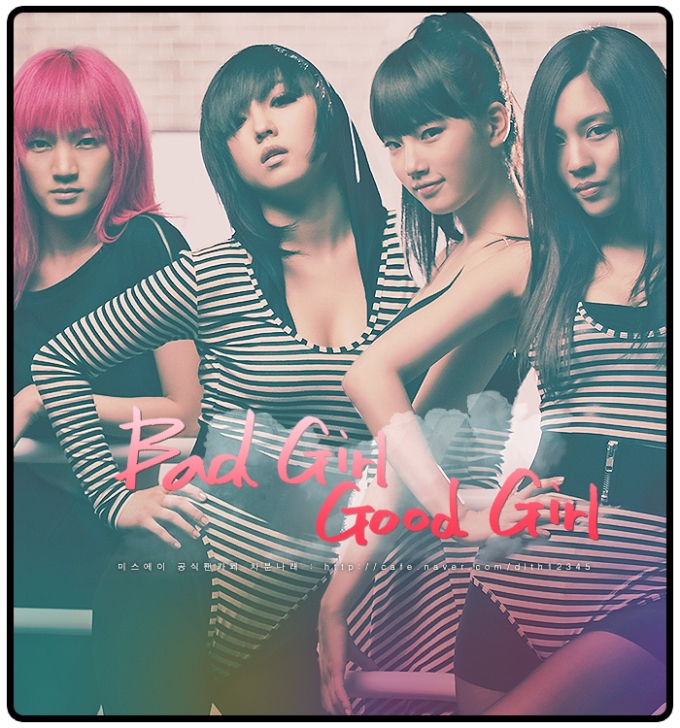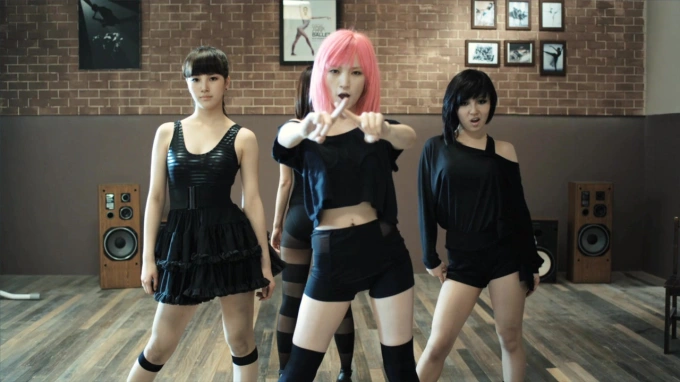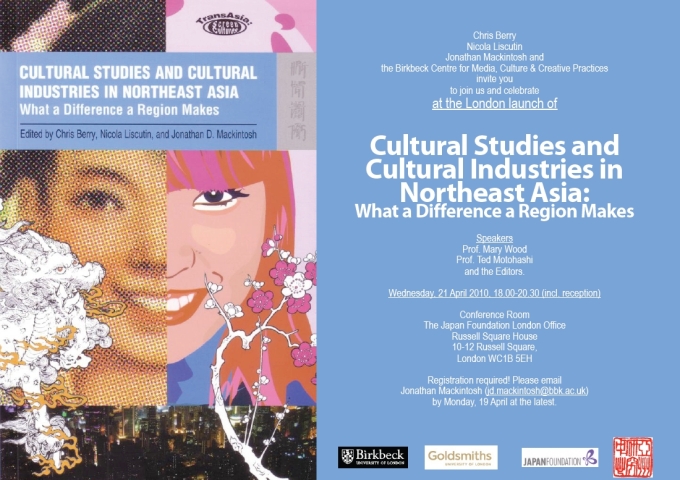 ( Source )
( Source )
Having just written that I find new girl groups virtually indistinguishable from each other these days, then I’m very glad reader “abcfsk” persuaded me to take a closer look at Bad Girl, Good Girl (배드걸 굿걸) by Miss A (미쓰에이), as I grew to like it very quickly. And not just because of the eye-candy in the music video either, which I deliberately avoided watching so as to better compare my own translation of the lyrics to the one there later.
But hell: taken from a zip-file available here, in hindsight the screenshots below didn’t really do justice to the eroticism of some of the dance moves. And which to be frank, made finally seeing the video itself almost feel like a reward for all my hard work.
No great surprise to learn that Park Jin-young (박진영) is their manager then, as he is notorious for that sort of thing. Granted, that is the way the whole Korean music industry is going these days, primarily as a means for new groups to stand out, but those groups under the JYP Entertainment label do seem to push the boundaries more than most.
Focusing on the lyrics for now though, here’s my own original translation of them, with explanations of those parts I found difficult:
You don’t know me, you don’t know me
You don’t know me, you don’t know me
So shut up boy, so shut up boy
So shut up boy, so shut up, shut up
앞에선 한 마디도 못 하더니
뒤에선 내 얘길 안 좋게 해 어이가 없어
Hello, hello, hello
나같은 여잔 처음 으로 으로 으로
본 것 같은데 왜 나를 판단하니
내가 혹시 두려운거니
You don’t know me, you don’t know me
You don’t know me, you don’t know me
So shut up boy, so shut up boy
So shut up boy, so shut up, shut up
In front of me you can’t say a word
And I can’t believe the bad things you say about me behind my back
Hello, hello, hello
I think this is the first time you’ve ever met a woman like me…why do you judge me?
Am I a thing to be feared?
 ( Source, all screenshots: Red and Rosy )
( Source, all screenshots: Red and Rosy )
Starting with Line 1 of the Korean after “shut up” etc., the “더니” in “하더니” has many usages according to page 277 of my reference guide, Korean Grammar for International Learners (KGIL), but I think the most appropriate is number 1, that which “allows the speaker to affirm that some fact which (s)he directly experienced or witnessed in the past about a third-person subject is the reason or source for the state of affairs in the follow clause…the subject is usually second or third person”.
That allows the fact that the unnamed man (her boyfriend?) is reticent in front of her to be linked to line 2, that he badmouths her behind her back. But which was actually much more difficult to translate than it looked, as “뒤에선 내 얘길 안 좋게 해 어이가 없어” is literally “[me] behind as for – my story – not well do – word – not have”, which sort of looks like what I ultimately wrote, but was ripe for misinterpretation. Once my long-suffering wife told me that “어이가 없어” actually means “I can’t believe” though, then I was able to muddle along.
In line 6, the “거니” in “두려운거니” isn’t in KGIL, but I think it’s shorthand for “두려운것이에요”, or “scary thing is”. Hence I used the noun form “am I a thing to be feared?” in my translation, but of course something like “are you scared of me?” would be fine too.
Now for the chorus:
겉으론 bad girl 속으론 good girl
나를 잘 알지도 못 하면서
내 겉모습만 보면서
한심한 여자로 보는 너의 시선이 난 너무나 웃겨
춤 출 땐 bad girl 사랑은 good girl
춤추는 내 모습을 볼 때는 넋을 놓고 보고서는
끝나니 손가락질 하는 그 위선이 난 너무나 웃겨
On the outside I’m a bad girl, on the inside I’m a good girl
While you don’t know me well
While only looking at my outward appearance
Thinking of me as a pathetic woman is so laughable
When I dance I’m a bad girl, but when it comes to love I’m a good girl
When you see me dance you lose your mind
Only then to scorn me when the dance is ended
I laugh at your hypocrisy
In line 1, I was surprised that “으로” was used instead of “에”, as I’d always thought the former was used mostly for directions and processes rather than physical locations, but my wife assures me that the latter can’t be used at all in this case (oh well). She also told me that in line 4, “pathetic” would be a much better translation of “한심하다” than the “pitiful; pitiable; wretched” and so on that my dictionary gave; that in the case of line 6 at least, “모습” really means just “me” rather than “outward appearance” or “figure”; and finally that “넋을 놓고 보다” means “to lose one’s mind”, which I would never have got figured out otherwise. I did realize that “보고서” at the end looked a bit weird though – “a written report” – and ultimately the “고서” in it turns out to be one more grammar pattern. Which according to p. 251 of KGIL, has the effect of:
…tightening the relationship between the preceding and following clause, and implying that the contents of the second clause are a natural and closely linked follow-on to those of the first. In other words, whereas “고” alone is appropriate when a long interval intervenes between the two clauses, “고서” is appropriate when the connection is more immediate”.
Finally in line 7, of course “끝나니” is short for “끝나니까”, or “because it finished”. Add “scorn” and “hypocrisy” in there as well, then whatever the particulars of the last 2 lines, I got the impression that the man is captivated by her dancing, but then scorns and thinks little of her as soon as she stops and the spell is broken. Hence laughing at his hypocrisy, although now I’m little confused about the narrative of the song as I type this, as by this stage at least I thought the whole point was that she shouldn’t be judged by her outward appearance and actions…whereas now it appears that they’re actually also her strong points.
이런 옷 이런 머리모양으로 이런 춤을 추는 여자는
뻔해 ha 네가 더 뻔해, 오~
Hello, hello, hello
자신 없으면 저 뒤로 뒤로 뒤로
물러서면 되지 왜 자꾸 떠드니
속이 훤히 보이는 건 아니
A woman with those clothes, that hairstyle, and doing that dance
is shameless? Ha! You’re even more shameless, oh~
Hello, hello, hello
If you have no confidence, you can step back back back there
Why do you frequently make so much noise complaining about me?
I can see right through you
In line 4, I was a little confused for a moment by “저”, which is short for “저기” or “there” rather than being the respectful form of “me”. And then by “자신 없으면 저 뒤로 뒤로 뒤로 물러서면 되지” in lines 4-5, which literally means “confidence – if not have – there – towards the back towards the back towards the back – if step back” and looks like an unnecessary and confusing repetition to me.
Finally, line 6 was a big stumbling block: first, I originally thought “아니” meant “no”, but it’s actually “know”, as in “알다”. Then, “훤하다” means “gray, dimly-lit”; “extensive, broad and wide, spacious”; “good-looking”; and finally “be familiar with” and I was plumping for the first meaning until my wife said the last would be better.
Speaking of whom, to anybody envious at my Korean ability evident in translations in numerous earlier posts, and surprised at (and tired of) how much I’ve needed my wife’s help this time(!), then, well, I’d be lying if I said she didn’t have a huge role in correcting my numerous mistakes and explaining things after I do the original translations (I probably wouldn’t be able to properly provide any at all without her). I just haven’t mentioned that before because I usually don’t talk about the translation process itself, and how much time and effort it takes us.
Which gives me a newfound respect for those studying Korean entirely by themselves! But getting back to the lyrics though, after the above there’s the chorus again, and then the final verse:
날 감당 할 수 있는 남잘 찾아요
진짜 남자를 찾아요
말로만 남자다운 척 할 남자 말고
날 불안 해 하지 않을 남잔 없나요
자신감이 넘쳐서 내가 나일 수 있게
자유롭게 두고 멀리서 바라보는
I’m looking for a man who can bear me
I’m looking for a real man
Not a man who only talks like a real man
Is there no man that I don’t make uneasy?
Who can’t give me the freedom to watch me become a woman overflowing with confidence?
Finally, an easy verse! Any fellow Korean learners, please feel free to ask me about any of it, but otherwise that’s the whole song already, but for the chorus and finally the English opening sequence again.
Reluctantly tearing my eyes away from the singers (especially Fei {페이}) to the translated lyrics in the video then, I’m happy to say that they appear to be very similar, although there do appear to be some differences between the subjects in the some cases (in other words, I’ve got some “he”s where TheKpopSubber has “she”s and so on).
I’d like to look at those in more detail, but unfortunately I’m about to go out on a big shopping trip with my wife and kids, so for now I’ll just have to leave the post for you to enjoy as it is I’m afraid (those of you also unnerved by mistaken recent reports that North Korea was shelling again, may be happy for the distraction!). But of course, do please feel free to discuss those differences and/or anything about the song, group, and/or MV yourselves, although still knowing so little about the group then I’m going to reserve my own analysis until I’ve at least translated their second hit Breathe (브리드) next week:
Enjoy!^^
Update: Wait…one of them’s only just turned 16? Another middle-school student in a girl band?
Update 2: Given Miss A’s Chinese angle mentioned in the comments (2 of singers are Chinese, and they’ve been promoting themselves extensively there), then I’d like to point interested readers to Rowan Pease’s chapter “Korean Pop Music in China: Nationalism, Authenticity, and Gender” in Cultural Studies and Cultural Industries in Northeast Asia: What a Difference a Region Makes, edited by Chris Berry, Nicola Liscutin, and Jonathan D. Mackintosh, (2009, pp. 151-167), in which (among many other interesting things) she explains that:
 ( Source: The Japan Foundation )
( Source: The Japan Foundation )
In 2003, the Korean National Tourism Office [a major investor in the Korean wave] conducted a Hanliu tourism survey in China, Taiwan, and Hong Kong exploring attitudes to Korean culture, publishing the results online…
….It compared the impact of Korean culture with that of four “competitor” countries (the U.S., Japan, Taiwan, and Hong Kong), and in the process revealed much about Korea’s own political and nationalist concerns, particularly in relation to Japan and America. Six of the eleven options for respondents to the category “reasons I like Korean culture” reflect this preoccupation: “less sexual than Japanese culture,” “less sexual than American culture,” “less violent than Japanese popular culture,” “less violent than American popular culture,” “decreased interest in American culture,” and “decreased interest in Japanese culture.” One other echoes Straubhaar’s notion of cultural proximity: “similar in culture.” Certainly, Korea’s own music media censorship laws (which even in 1997 prohibited the displaying of body piercings, navels, tattoos, “outfits which might harm the sound emotional development of youth,” and banned violent or political lyrics), meant that Chinese TV stations could buy in Korean music videos and music TV shows knowing that they were unlikely to upset local censors. However, these questions also reflected a perception that Korea acts as a defender against excessive Westernization and as a guardian of Confucian values within East Asia. (pp. 155-156)
I wonder if those perceptions still hold true for China today, and in particular just how safe and “less sexual” than American and Japanese culture music videos like this one are viewed by Chinese TV stations?
Filed under: Girl Groups, Korean Music, Song Lyrics & Translations Tagged: Bad Girl Good Girl, 미쓰에이, 박진영, 배드걸 굿걸, 배드걸 굿걸 기사, JYP, Miss A, Park Jin-young












Recent comments